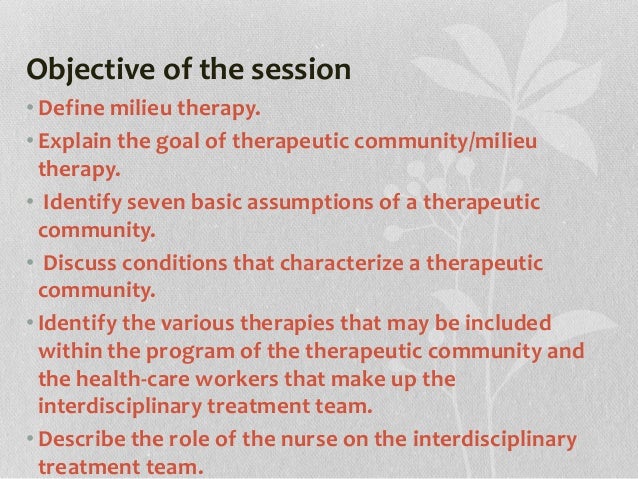Imagine stepping into a space where healing isn’t just about medication and procedures, but about fostering a sense of safety, belonging, and growth. This is the essence of milieu therapy, a therapeutic approach that utilizes the entire environment as a tool for healing. But who are the architects of this therapeutic landscape? The answer, in large part, lies with nurses, who play a crucial role in shaping and sustaining the therapeutic milieu.

Image: www.slideshare.net
Milieu therapy, derived from the French word for “environment,” involves creating a structured, supportive environment where patients can interact with one another and staff in a therapeutic manner. This approach goes beyond individual therapy, emphasizing the power of the environment and the relationships within it to promote healing and recovery. Nurses, as constant presences in the therapeutic milieu, are instrumental in ensuring its effectiveness and facilitating the patients’ progress.
Building a Foundation of Safety and Trust
Creating a Safe and Structured Environment
At the heart of milieu therapy lies the creation of a secure and predictable environment. This involves establishing clear rules and boundaries, fostering open communication, and promoting respect for all individuals. Nurses, as integral members of the therapeutic team, play a vital role in upholding these principles. They are responsible for administering medications, ensuring patient safety, and responding to emergencies—all actions that contribute to a sense of stability and security.
Establishing Therapeutic Relationships
Nurses are often the first point of contact for patients in a therapeutic setting. This allows them to build rapport and establish trusting relationships, which are crucial to the success of milieu therapy. A nurse’s genuine empathy, active listening skills, and consistent presence create an atmosphere of warmth and understanding, empowering patients to feel comfortable sharing their experiences and seeking support.

Image: home.bt.com
Navigating the Challenges of Group Dynamics
Facilitating Group Interactions
Milieu therapy encourages interaction among patients, promoting social skills and fostering a sense of community. Nurses play a significant role in guiding these group dynamics. They observe patient interactions, identify potential conflict, and intervene when necessary, always with the goal of promoting mutual respect and constructive communication.
Providing Individualized Care within a Group Context
While the milieu therapy approach emphasizes group interactions, nurses are also acutely aware of the individual needs of each patient. They tailor their interactions to meet specific needs, offering support, encouragement, and guidance as patients navigate their unique challenges. They also act as advocates for patients, ensuring their individual needs are met within the context of the group therapy plan.
Promoting Self-Care and Independence
Encouraging Active Participation
Nurses work diligently to promote patient autonomy and self-care. They encourage patients to actively participate in their treatment by offering choices whenever possible and supporting their efforts to take ownership of their recovery. This might involve assisting with daily living activities, facilitating decision-making, and providing opportunities for self-expression.
Transitioning to Independence
As patients progress in their recovery, nurses play a crucial role in preparing them for a successful transition back into their communities. They help patients develop coping mechanisms, practice independent living skills, and establish connections with community resources. This gradual process of reintegration is essential for long-term well-being.
Embracing Innovation and Evidence-Based Practices
Staying at the Forefront of Milieu Therapy
The field of milieu therapy is continuously evolving, with new research and best practices emerging. Nurses play an important role in staying abreast of these developments. They actively participate in professional development opportunities, collaborate with researchers, and implement evidence-based practices to enhance the effectiveness of milieu therapy.
Adapting to Individual Needs
Nurses recognize that no two patients are alike, and their approach to milieu therapy is flexible and responsive. They adapt existing practices to meet the unique needs of each individual, ensuring that the therapeutic environment is tailored to maximize the likelihood of success.
Role Of Nurse In Milieu Therapy
The Ongoing Impact of Nurses in Milieu Therapy
The role of nurses in milieu therapy is multifaceted and essential. Their commitment to creating a safe and supportive environment, fostering therapeutic relationships, and promoting patient autonomy empowers individuals to navigate challenging times and embrace pathways to healing. Their contributions are not only instrumental to individual recovery but also serve as a testament to the power of compassion, empathy, and professional dedication in shaping truly therapeutic environments.
Interested in learning more about the role of nurses in milieu therapy? Explore the resources provided by professional organizations such as the American Nurses Association (ANA) and the American Psychiatric Nurses Association (APNA). Consider reaching out to local mental health facilities to inquire about volunteer opportunities or shadowing experiences.






